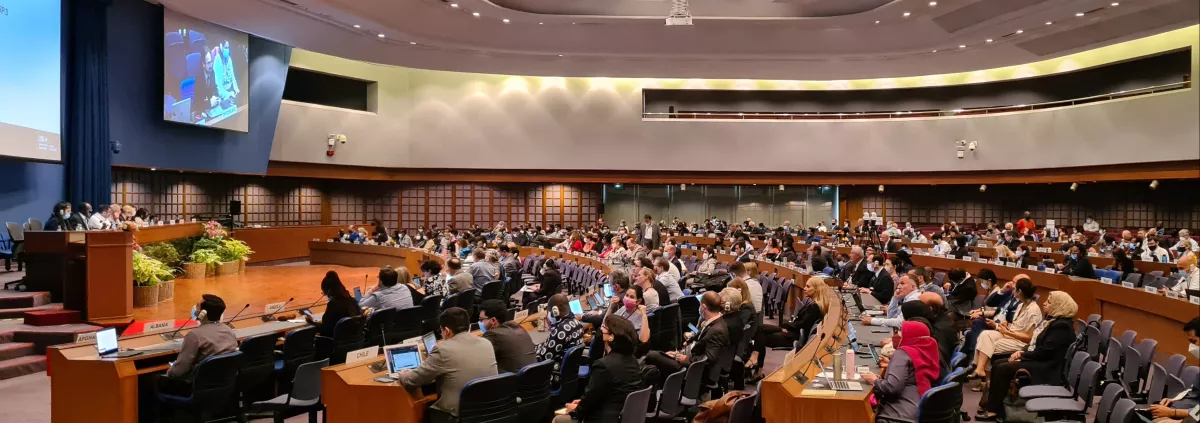EVENT BRIEF:
44th meeting of the Open-Ended Working Group
and 5th Extraordinary Meeting of the Parties to the Montreal Protocol
As the most successful environmental treaty, the Montreal Protocol has protected the Earth’s ozone layer by phasing out the chemicals that deplete it since its entry into force in 1989.
This year’s event, which took place in Bangkok, Thailand, gathered hundreds of delegates and was focused on effective implementation and monitoring and the necessary funding, without which ozone depletion could continue unabated, with serious impacts on human health and the environment.
Parties also discussed a report on energy-efficient technologies that have low global warming potential.
What you need to know:
1. Parties agreed on replenishment size for the Multilateral Fund for 2021 to 2023
The amount of USD 540 million is agreed by Parties to the Montreal Protocol to be replenished for the Multilateral Fund for the 3-year period from 2021 to 2023.
2. Discussion on addressing discrepancies between atmospheric monitoring and on-the-ground observations continued
Having a robust monitoring system in place is crucial to the implementation of the Montreal Protocol. Delegates continued their discussion on this matter and a report will be prepared on where the substantial emissions of controlled substances are likely to occur and what can be done to better reflect actual emission levels.
The OEWG-44 meeting also addressed questions of gaps in global monitoring of ozone-depleting substances (ODS) and specific usage and production of methyl bromide and carbon tetrachloride (CTC).
3. Increasing energy efficiency and tackling the dumping of obsolete technologies in poorer countries were highlighted
Parties highlighted the need to enhance energy efficiency while phasing out and phasing down the controlled substances of the Montreal Protocol. The importance of developing and enforcing mandatory minimum efficiency performance standards (MEPS) and strengthening the capacity of developing countries on adopting new standards and energy-efficient technologies were stressed during the meeting.
Parties also discussed tackling the dumping of obsolete technologies in poorer countries, such as items that use refrigeration equipment which ran on controlled substances or new equipment that was not energy efficient.
4. The achievements of Paul Jozef Crutzen, Mario Jose Molina and Frank Sherwood Rowland were recognized
The great achievements of the three scientists Paul Jozef Crutzen, Mario José Molina and Frank Sherwood Rowland were recognized to mark the 35th anniversary of the Montreal Protocol in 2022.
The three scientists were awarded the Nobel Prize in 1995, for their work in atmospheric chemistry, particularly concerning the formation and decomposition of ozone.
UNDP at the events:
UNDP attended the Montreal Protocol’s OEWG and MOP meetings to represent UNDP's related work, connect with current and potential experts and partners and organized one side event:
• Beating the Heat: Achieving Sustainable Cooling through National Cooling Plans highlighted and shared findings from National Cooling Plans developed by countries. Learn more about UNDP’s approach to National Cooling Plans: Presentation on National Cooling Action Plans, Presentation on Innovative Financial Solution Options, and NCP Summary Introduction.
UNDP also participated in three other side events organized by its partners:
• Innovative approaches for the implementation of the Kigali Amendment organized by GIZ presented and discussed tools and concepts for ambitious Kigali Implementation Plans (KIPs).
• CCAC side event on HFC consumption trends in A5 countries presented the findings of a new study on the Impacts of HFC Consumption Trends in Article 5 Countries and engaged in a discussion with all MLF implementing agencies, on steps needed to comply with the Kigali control schedule.
• Cool-Up side event provided an overview of international safety standards for smaller commercial refrigeration equipment, presented policy measures on emission reduction and energy efficiency that have proven to be effective in the European Union and demonstrated the benefits of hydrocarbon-based equipment.
Cooling and the climate:
Today the Refrigeration and Air Conditioning (RAC) sector are one of the fastest-growing energy-consuming sectors, estimated to have a market growth rate of 7% per annum until 2050. As temperatures increase, the demand for cooling will rise and so will the intensification of HFCs and other greenhouse gases in our atmosphere.
The Kigali Amendment encourages sustainable cooling by progressively reducing the reliance on HFCs and offers opportunities for energy efficiency gains. Countries also have the opportunity to include the RAC sector as well as HFC emission targets in their National Determined Contributions (NDCs) under the Paris Agreement.
For more, please see UNDP’s Sustainable Cooling Offer.
What's next?
• 31 October - 4 November 2022: The 34th MOP will take place in Montreal, Canada.
Refresher: What are the Vienna Convention and the Montreal Protocol Treaty?
The Vienna Convention is a framework convention that lays out principles agreed upon by many parties. It does not, however, require countries to take control actions to protect the ozone layer. This would come later in the form of the Montreal Protocol.
The Montreal Protocol on Substances that Deplete the Ozone Layer is an international treaty designed to protect the ozone layer by phasing out the production of numerous substances that are responsible for ozone depletion. The most recent amendment, the Kigali Amendment, calls for the phase-down of hydrofluorocarbons (HFCs) in 2016 and was entered into force in 2019.
HFCs have been used as replacements for a batch of ozone-depleting substances eliminated by the original Montreal Protocol. Although they do not deplete the ozone layer, they are known to be powerful greenhouse gases and, thus, contributors to climate change.
The two ozone treaties have been ratified by 197 parties (196 states and the European Union), making them the first universally ratified treaties in United Nations history.

Please log in or sign up to comment.